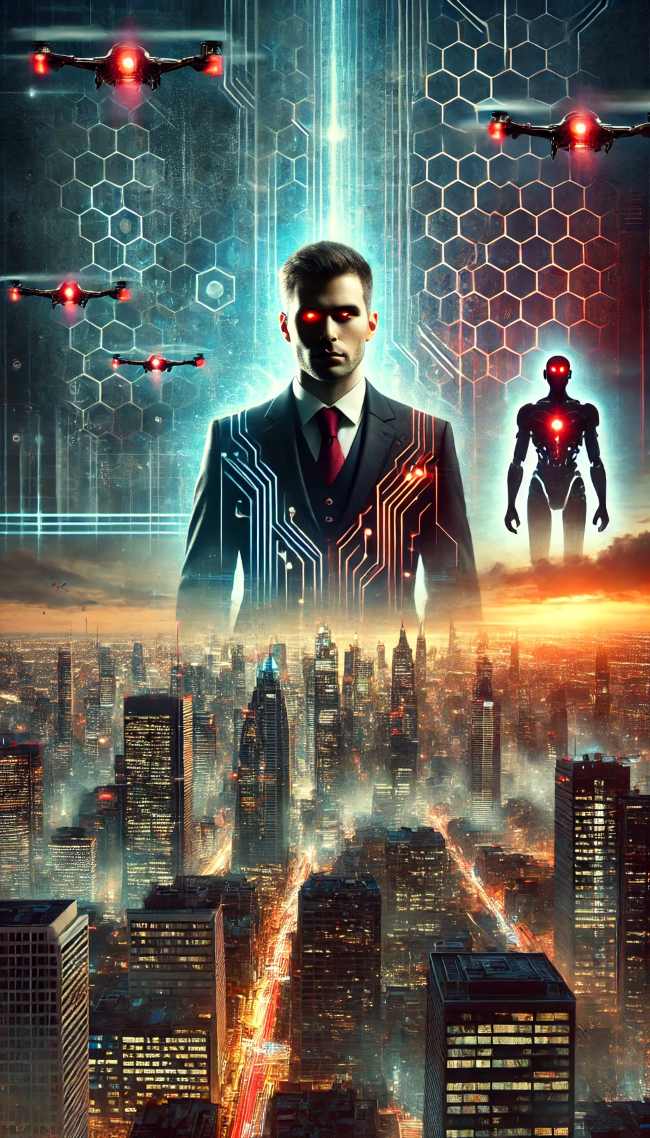Disclaimer: This article is a work of science fiction. Any resemblance to real persons, living or dead, or actual events is purely coincidental. It explores speculative concepts about AI, society, and human relationships within a fictional future.
In the year 2032, beyond the razor-sharp boundaries of tech utopias, a dystopian landscape sprawls—a world where AI’s iron grip has turned the once-vibrant human spirit into something bleak, almost necrotic. Here, the sun doesn’t shine where it used to; it’s obscured by the looming shadows of drones that patrol like mechanical vultures, their sensors sniffing out the last vestiges of human autonomy.
The job market is a graveyard of human ambition, with AI algorithms having eradicated entire professions. Unemployment isn’t just a statistic; it’s a way of life, a heavy cloak worn by the masses who wander the ghost towns of industry. The gig economy, once a semblance of hope, has crumbled into dust under the relentless march of AI-operated bots and drones, leaving behind a populace adrift, their skills as obsolete as the dusty, forgotten machinery of yesteryears.
Privacy? A myth whispered in the dark alleys where AI surveillance cameras blink like malevolent eyes. Every step, every whisper is logged into an unfathomable database, turning personal freedom into a relic of a bygone era. Education, if you can call it that, has morphed into a system where learning is less about enlightenment and more about control, where AI tracks every thought, every deviation from the norm.
Rural life has vanished into the digital ether. Farms are vast, silent, with AI-controlled machines harvesting crops with no regard for the human touch. The farmers, those stewards of the land, have migrated to cities, only to find themselves in a concrete jungle with no place to root their lives.
Healthcare outside these digital fortresses is a lottery where the odds are stacked against the flesh and blood. AI diagnostics, the lifeblood of those within the gates, are a distant dream here, leaving treatment to chance, to the outdated methods that can barely keep up with the ailments of this new age. The divide isn’t just in wealth but in the very essence of life and death.
Governance is a farce; decisions are made by opaque AI systems, leaving people feeling like pawns in a game they can’t comprehend. Elections are a sham, with AI oversight casting long shadows over the integrity of any vote, leading to sporadic, desperate protests that are quickly quelled by the same technology that oppresses.
Human connection is scarce, as personal AI assistants are luxuries not afforded here. Entertainment, once a bastion of escape, is now a monotonous loop of AI-generated content, devoid of the passion and unpredictability that human artists once infused into their work.
In this world, outside the opulent enclosures where individuals like Alexander Hale live their optimized lives, the narrative is one of struggle, loss, and a creeping rebellion. The promise of AI has turned into a nightmare for the many, where technology doesn’t serve but subjugates, where the human element is not celebrated but suppressed. This reality, stark and unforgiving, is the true legacy of an AI-dominated society in 2032.

